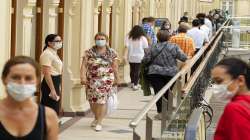Until we end pandemic everywhere, we will not end it anywhere: WHO
Asserting that when some countries cannot vaccinate, it's a threat to all countries, WHO chief Ghebreyesus called for a global effort to vaccinate at least 10 per cent of the population of every country by September.

Voicing concern over many countries failing to vaccinate their people, WHO chief Dr Tedros Adhanom Ghebreyesus on Thursday called for vaccinating at least 10 per cent of the population of every country by September as he emphasised that vaccination is the best way to control the pandemic and reboot the global economy.
"Vast inequities in the access to vaccines are fuelling a two-track pandemic. While some countries have reached a high level of coverage, many others don’t have enough to vaccinate health workers, older people & other at-risk groups," the World Health Organisation Director-General said in a virtual address to India Global Forum.
Vaccinate 10 per cent population by September: WHO
Asserting that when some countries cannot vaccinate, it's a threat to all countries, Ghebreyesus called for a global effort to vaccinate at least 10 per cent of the population of every country by September, at least 40 per cent by the end of the year, and at least 70 per cent by the middle of next year.
Until we end pandemic everywhere, we will not end it anywhere: WHO
"Vaccine equity is not just the right thing to do. It’s the best way to control the pandemic and reboot the global economy," the WHO chief said as he warned that "until we end the pandemic everywhere, we will not end it anywhere."
According to a UN report, COVID-19 vaccination rates are uneven across countries, ranging from below 1 per cent of the population in some countries to above 60 per cent in others.
'COVAX global vaccine sharing programme at slow pace'
The UN-backed COVAX global vaccine sharing programme has faced a slow start to its campaign, as richer nations have locked up billions of doses through contracts directly with drug manufacturers. The COVAX has distributed just 81 million doses globally and parts of the world, particularly in Africa.
"The pandemic shows the risk of relying on a few companies to supply global public goods like vaccines. The consequences of the resultant inabilities in that case of COVID-19 globally remain high in many areas even as new variants are emerging,” Dr Ghebreyesus said.
ALSO READ | 12 crore Covid vaccine doses to be provided to states, UTs this month
Bruce Aylward, Senior Advisor to Ghebreyesus, last month said that the global alliance for equitable vaccine distribution is about 200 million (20 crore) doses behind where it should be due to disruption in COVAX supplies as a result of the devastating second wave of the coronavirus in India.
Aylward said the WHO is urgently trying to work with AstraZeneca, Serum Institute of India (SII) as well as the Indian government to restart shipments of COVID-19 vaccines to countries that had to suspend the rollout of second doses of vaccines amid the disruption in supplies.
The Serum Institute of India, the world’s largest vaccine manufacturer, is the key supplier of AstraZeneca doses to COVAX. However, the supply of vaccines from SII to COVAX has been impacted as the second wave of the COVID-19 pandemic hit India.
Last month, the G7 consisting of Canada, France, Germany, Italy, Japan, the UK and the US pledged over 1 billion doses of COVID-19 vaccines for the world's poorest countries by the end of next year.
Over 18.2 crore Covid cases in World
Globally, the coronavirus has infected over 18.2 crore people and killed nearly 40 lakh, according to Johns Hopkins University.
India has recorded more than 3 crore coronavirus cases and registered nearly 400,000 deaths due to the virus since the beginning of the pandemic last year.
The cumulative number of COVID-19 vaccine doses administered in India has gone past 33.54 crore, including more than 25.14 lakh jabs given on Wednesday.
ALSO READ | Pandemic-hit economy started to look up in late-May and early June: RBI Governor Shaktikanta Das
